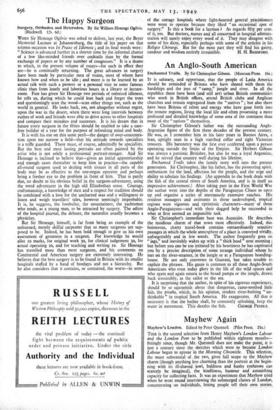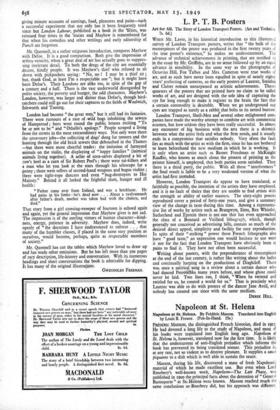Mayhew Again
Mayhew's London, Edited by Peter Quennell. (Pilot Press. 21s.) THIS is the second selection from Henry 1Vlayheves London Labour and the London Poor to be published within eighteen months— fittingly since, though Mr. Quennell does not -make the point, it is just a century since the sketches which were to become London Labour began to appear in the Morning Chronicle. This selection, the more substantial of the two, gives full scope to the Mayhew charm (though anything less charming than the portrait at the begin- ning with its ill-shaved jowl, baldness and bushy eyebrows can scarcely be imagined), the kindliness, humour and astonishing capacity for collecting facts. It was an experiment that Mayhew tried when he went round interviewing the submerged classes of London, concentrating on individuals, letting people tell their own stories, giving minute accounts of earnings, food, pleasures and pains—such a successful experiment that not only has it been frequently tried since but London Labour, published as a book in the 'fifties, was reissued four times in the 'sixties and Mayhew is remembered for that when his comedies and other writings and early editorship of Punch are forgotten.
Mr. Quennell, in a rather exiguous introduction, compares Mayhew with Defoe. It is a good comparison. Both give the impression of artless veracity, when a great deal of art has actually gone to suppres- sing irrelevant detail. To both the dregs of the city are essentially decent, kindly people. It was Mayhew's thief who refused to sit down with pickpockets saying : "No, no ! I may be a thief sir ; but, thank God, at least I'm a respectable one "; but it might have been Defoe's. Their Londons are alike too, in spite of the gap of a century and a half. There is the vast underworld disregarded by polite society, the poverty and hunger, the odd characters. Mayhew's London, however, was larger and dirtier than Defoe's, though bird- catchers could still go out for their captures to the fields of Woolwich, Isleworth and Tooting.
London had become "the great wen," but it still had its fantasies. There were rumours of a race of wild hogs inhabiting the sewers of Hampstead • boys went round the public houses reciting "To be or not to be " and " Othello's apology." People scraped a living from the streets in the most extraordinary ways. Not only were there the unsavoury jobs—the collecting of dogs' dung for tanners and the hunting through the old brick sewers that debouched in the Thames —but there were more cheerful trades : the imitation of farmyard animals on the violin, the displaying of "happy families" (inimical animals living together). A seller of corn-salves displayed a bit of zow's heel as a corn of Sir Robert Peel's ; there were rat-killers and a man who let you look at the stars through his telescope for a penny ; there were sellers of second-hand weapons and bogus violins ; there were tight-rope dancers and even "bug-destroyers to Her Majesty." Behind it all lurked the frightful slum, hunger and ill health : "Father came over from Ireland, and was a bricklayer. He had pains in his limbs—he's dead now . . . About a twelvemonth after father's death, mother was taken bad with the cholera, and died."
That story from a girl crossing-sweeper of fourteen is echoed again and again, yet the general impression that Mayhew gives is not sad. The impression is of the sterling virtues of human character—kind- ness, energy, patience in adversity. Mayhew does, indeed, write openly of "the doctrines I have endeavoured to enforce . . . that many of the humbler classes, if placed in the same easy position as ourselves, would become, perhaps, quite as respectable members of society."
Mr. Quennell has cut the tables which Mayhew loved to draw up and has made other omissions. But he has left more than soo pages of racy description, life-history and conversation. With its numerous headings and short conversations the book is admirable for dipping. It has many of the original illustrations.
GWENDOLEN FREEMAN.







































 Previous page
Previous page